Table of Contents+
Writing prompts for kids are tailored activities that cater to the developmental stages of children’s writing skills, from preschool through high school. For the littlest learners, ages 3-5, prompts are designed to be simple and often paired with drawing to help them narrate their stories. As children enter elementary school, ages 6-10, they encounter story starters and prompts that encourage more descriptive writing, allowing them to build a richer vocabulary and better sentence structure.
Middle schoolers, ages 11-14, are presented with writing prompts that challenge them to delve into their emotions and engage in critical thinking, thus honing their ability to express complex ideas. High school students, ages 15-18, work with prompts that introduce them to more sophisticated themes and reflective writing, preparing them for future academic endeavors and personal growth.
Across all ages, writing prompts are a fundamental tool that can stimulate imagination and creativity, support learning and language development, and provide a fun and interactive way for kids to develop a love for writing and storytelling.
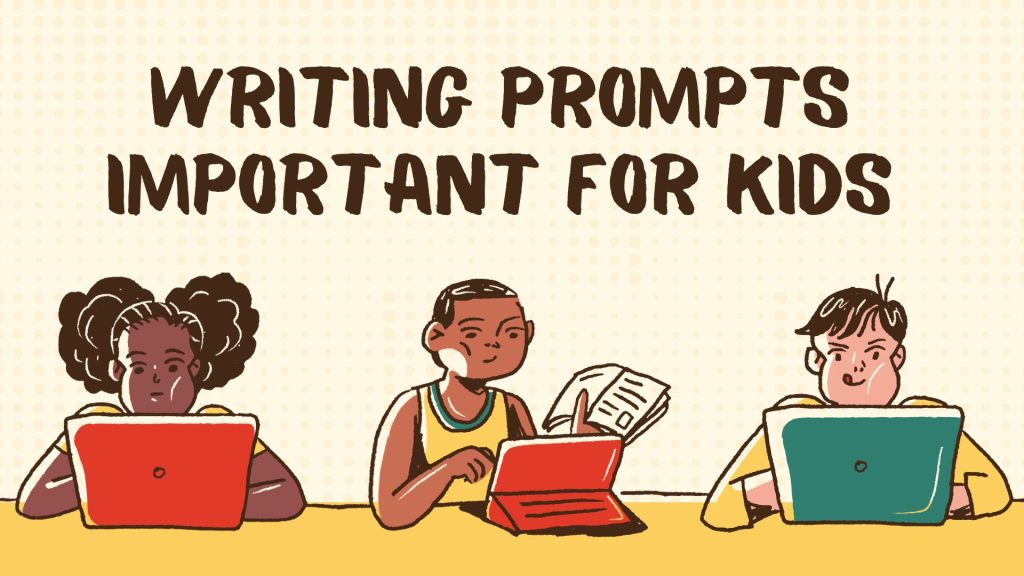
Why are Writing Prompts Important for Kids?
Writing prompts are essential for kids for several reasons:
Educational and Developmental Tool
- Catalyst for Creativity: Writing prompts encourage kids to use their imagination, leading to the creation of new worlds and characters, which is crucial for cognitive development and fostering creativity.
- Enjoyable Learning: Through imaginative play that prompts provide, children find joy in learning, which can increase their engagement with educational activities.
Language Skills Enhancement
- Vocabulary Building: Regular writing helps children learn new words and expand their vocabulary.
- Sentence Structure Mastery: Prompts encourage a better understanding of how sentences are formed.
- Grammar Practice: Continued writing practice aids in developing proper grammar usage.
Emotional Intelligence
- Expression and Exploration: Writing prompts allow children to express and navigate emotions.
- Development of Empathy: Articulating thoughts and feelings can increase emotional intelligence and empathy.
- Self-Discovery: For older children, reflective writing prompts based on personal experiences can help them understand themselves better and process their emotions.
Critical Thinking Development
- Problem-Solving Skills: Writing prompts often pose challenges that require children to think critically and solve problems.
- Analytical Writing: Encourages logical thought processes and the development of reasoning skills through analysis and structuring of thoughts.
Discipline in Writing
- Regular Practice: Varied and consistent writing exercises teach kids the importance of standard practice.
- Coherent Expression: Children who engage with writing prompts learn to express their ideas clearly and coherently, a crucial skill for academic success and future career opportunities.
Age-Appropriate Writing Prompts for Different Developmental Stages
Age-appropriate writing prompts are crucial in nurturing a child’s writing ability and cognitive growth at each stage of their development. Each stage is thoughtfully crafted to align with the student’s emotional and intellectual maturity, ensuring that writing remains a powerful tool for education and personal development.
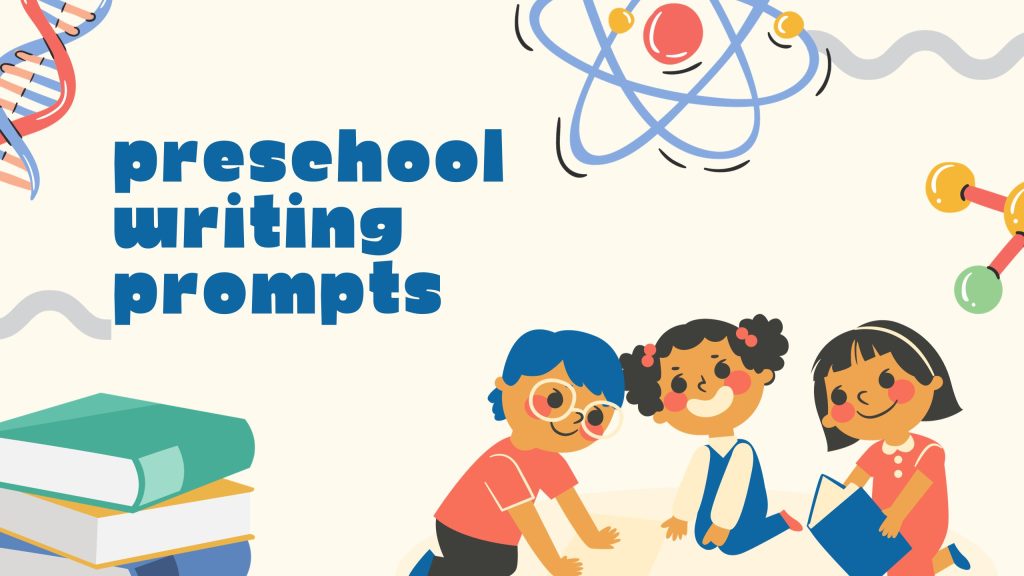
Preschool Writing Prompts (Ages 3-5)
- Write a story about [user’s favorite animal] and its adventures.
- Describe your favorite [user’s object] and why it is unique.
- Write about a day at the [user’s preferred location], including what you see, hear, and do.
- Imagine you are a [user’s preferred superhero]. What would be your extraordinary power, and how would you use it to help others?
- Write about a time when you felt [user’s chosen emotion] and why.
- Describe your dream [user’s preferred dwelling] and all the fun things you would do.
- Write a story about a magical [user’s chosen setting] and the living creatures there.
- Imagine you are a [user’s preferred profession]. What would you cook/create/build for breakfast, lunch, and dinner?
- Write about your favorite [user’s preferred outdoor activity] and why you enjoy it.
- Describe a particular [user’s preferred natural element or place] that you love to visit and why it is essential to you.
Elementary School Writing Prompts (Ages 6-10)
- Write a story about [user’s preferred setting] and the exciting adventures there.
- Imagine you could have any superpower. What would it be, and how would you use it to [user’s preferred action]?
- Write about a time when you showed kindness to [user’s chosen person or group] and how it made you feel.
- Imagine you found a hidden [user’s preferred object]. Describe what it looks like and what you would do with it.
- Write a letter to your future self. What goals do you hope to achieve, and what advice would you give yourself about [user’s chosen topic]?
- Describe your favorite [user’s preferred book, movie, or TV show] and explain why you think others should [read/watch] it.
- Write a persuasive essay convincing your parents or teachers to [user’s request].
- Imagine you could invent a new holiday. What would it be called, and how would people celebrate it in [user’s preferred way]?
- Describe a unique talent or skill and explain why you enjoy [performing/practicing] it.
- Write about a person who inspires you and explain how they have positively impacted your life or the world around them.
Middle School Writing Prompts (Ages 11-14)
- Please write a short story about a character who discovers they have a unique superpower, such as [user’s custom superpower].
- Imagine you could travel back in time to any historical event. Which event would you choose, and what would you do there?
- Write a persuasive essay arguing for or against using [user’s selected item or technology] in schools.
- Imagine you woke up one morning with the ability to [user’s chosen ability]. Describe what you would do with this newfound skill.
- Write a descriptive essay about your dream vacation destination to [user’s customized location] and why it appeals to you.
- Imagine you could have a conversation with any famous person, dead or alive. Who would you choose, and what would you talk about?
- Write a story from the perspective of an inanimate object, such as a [user’s selected object].
- Describe a time when you faced a challenge or obstacle, such as [user’s customized situation], and how you overcame it.
- Write a letter to your future self, reflecting on your goals and aspirations for [user’s customized future time frame].
- Imagine you could invent a new technology that would benefit the world. Describe what it is and how it would work.
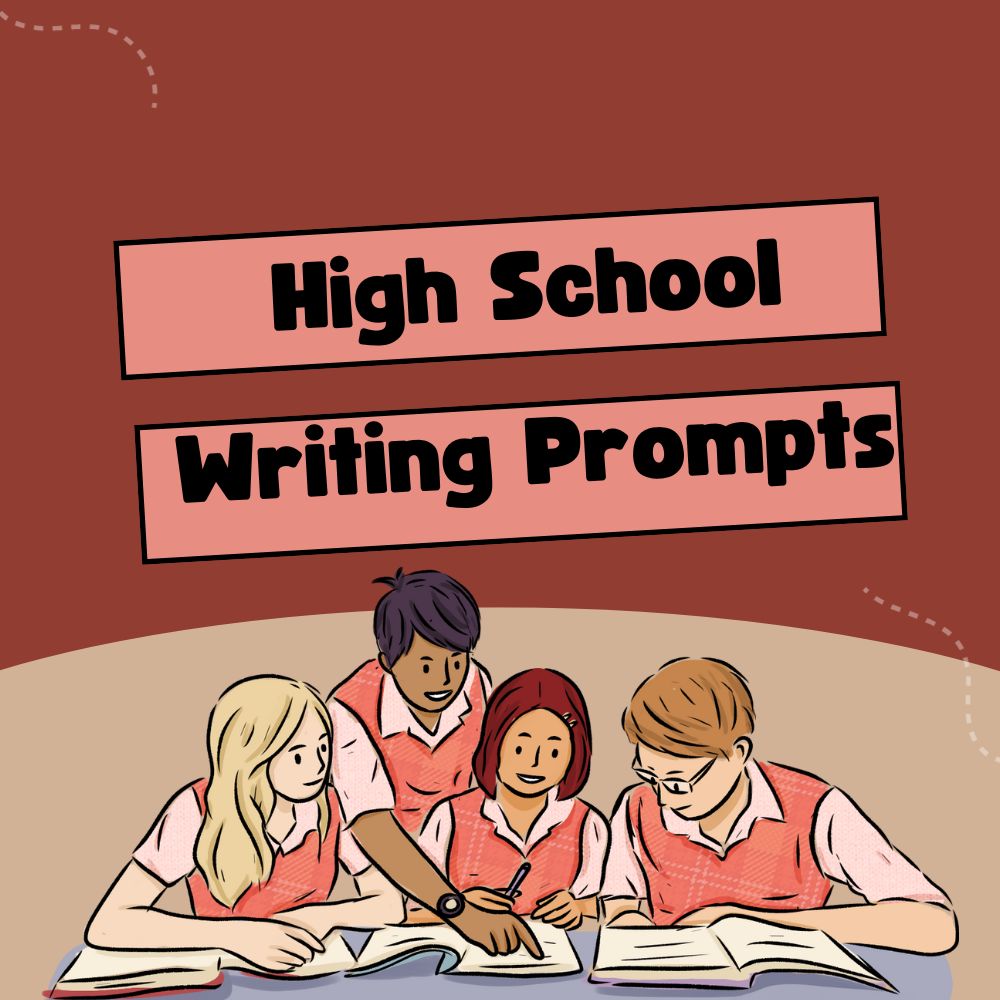
High School Writing Prompts (Ages 15-18)
- Write a short story about a future society where technology has fundamentally changed people’s lives, incorporating [user’s customized technological advancements].
- Imagine you could have a conversation with any historical figure, such as [user’s chosen historical figure]. What would you talk about?
- Write a persuasive essay arguing for or against implementing [user’s customized social or economic policy] in society.
- Describe a place you have visited that profoundly impacted you, such as [user’s chosen location], and why it was meaningful.
- Write a reflective essay about a book or literature that has influenced your perspective on the world, such as [user’s chosen book or literature].
- Imagine you are a character in your favorite movie. How would you change the plot or outcome?
- Write a research paper on the impact of social media on mental health and well-being, focusing on [user’s chosen aspect of social media].
- Describe a significant personal experience or achievement that has shaped who you are today, such as [user’s customized experience or achievement].
- Write a letter to your future self, reflecting on your goals, aspirations, and fears for the year [user’s customized future time frame].
- Imagine inventing a new form of sustainable energy, such as [user’s customized form of sustainable energy]. Describe how it would benefit society and the environment.
Imaginative Story Starters
Imaginative story starters encourage children to think outside the box, invent unique characters, and build engaging plots. They provide a starting point or a seed of inspiration that ignites the imagination and invites young writers to craft their extraordinary tales. These prompts allow children to dive into fantastical worlds, embark on thrilling adventures, or delve into the depths of their imagination.
Adventure and Exploration Prompts
- Your friends discover a hidden [user’s customized location], like a secret cave or a magical forest. Describe what you find inside and what adventures await.
- Imagine you are an explorer sailing across uncharted waters, encountering [user’s customized friendly sea creatures or mysterious islands] as you discover a new land for the first time.
- Write a story about a group of young adventurers who embark on a thrilling expedition to uncover a long-lost [user’s customized treasure or artifact], such as a pirate’s chest or a magical amulet.
- You come across a mysterious map with cryptic symbols. Describe your journey as you follow the map’s clues to an unknown destination, such as a hidden island or a remote jungle filled with [user’s customized challenges or surprises].
- Imagine you are an astronaut landing on a distant planet filled with colorful aliens and strange plants. Describe the landscape and any unusual discoveries you make, such as finding [user’s customized friendly alien creatures or exciting space rocks].
Magical Realms prompts
- In the Enchanted Forest, [user’s name] discovers a mysterious talking animal who offers to grant them one wish. What do they wish for, and what magical adventures unfold?
- Deep beneath the waves, [user’s name] uncovers a hidden underwater kingdom ruled by friendly mermaids and mischievous sea creatures. What challenges do they face to prove their worth and become an honorary citizen of this magical realm?
- While exploring a dusty attic, [user’s name] stumbles upon a magical portal that transports them to the Land of Imagination. Everything they think becomes a reality! What incredible things do they imagine, and how do they learn to control their newfound powers?
- During a meteor shower, [user’s name] witnesses a shooting star crash-landing in their backyard. The star is a lost celestial being who needs their help to find their way back home to the Celestial Realm. Can [user’s name] assist them on their journey and discover the secrets of this enchanting realm?
- One day, [user’s name] receives a letter from an owl inviting them to attend the prestigious School of Wizardry. They learn about spells, potions, and magical creatures at the school. Describe their adventures as they make friends, face challenges, and uncover the mysteries hidden within the ancient castle’s walls.
Time Travel Writing prompts
- Imagine you come across a mysterious time-traveling object [customize the object] that sends you back to meet a famous inventor or scientist. Write a story about your encounter, including the inventions they show you and the questions you ask them.
- You discover a secret time-traveling portal [customize the portal location] that takes you to different periods of history. Choose one specific era [customize the era] and write a diary entry describing your experiences, including the people you meet and the events you witness.
- You receive a magical time-traveling pet [customize the type of pet] that can transport you to any place in the past or future. Write a persuasive letter to your parents, explaining why they should let you take your pet on an exciting time-travel adventure [customize the destination or purpose of the journey].
- You find an old journal [customize the type of journal] that contains detailed instructions on how to build a time machine. Write step-by-step instructions, including the materials needed and the precautions to take, so other kids can develop their time machine [customize any additional challenges or requirements].
- You wake up one morning to discover that time has stopped for everyone except you. Write a creative story about how you use this opportunity to explore different periods [customize the periods] and your adventures while trying to solve the mystery of what caused time to freeze.
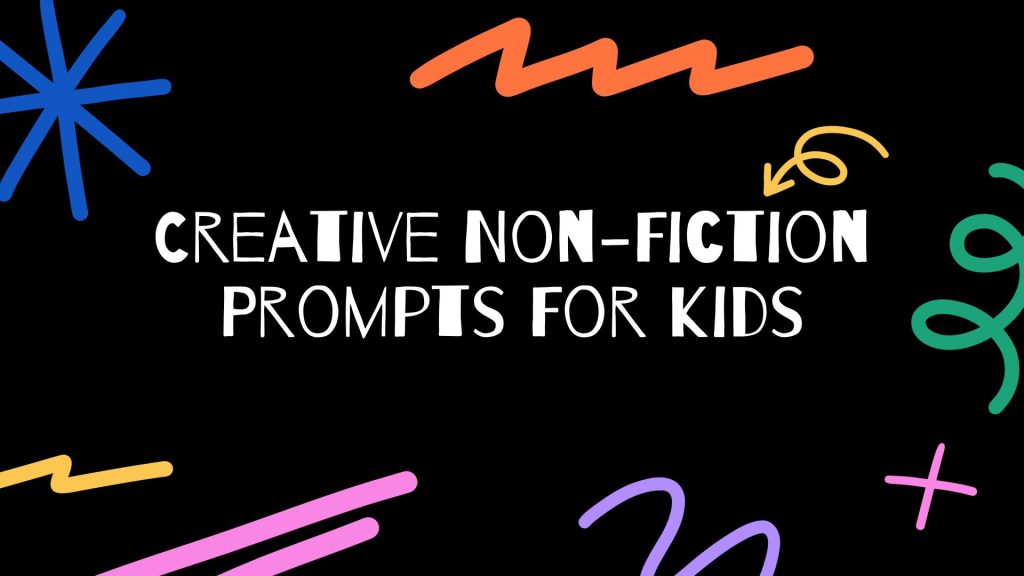
Creative Non-Fiction Prompts
Creative non-fiction prompts for kids are a fantastic way to engage young minds and nurture their writing abilities. Unlike traditional fictional storytelling, creative non-fiction prompts allow children to explore real events, experiences, and ideas, while still giving them the freedom to exercise their imagination.
With a wide range of topics to choose from, creative non-fiction prompts are an excellent tool for fostering creativity, self-expression, and critical thinking skills in young writers.
Biographical Sketches Prompts
- Write a biographical sketch about a [choose historical figure] who has made a significant impact in the field of science or technology.
- Choose a [famous artist or musician] and write a biographical sketch that explores their journey to success and the challenges they faced along the way.
- Select a [choose political leader] from history and write a biographical sketch that delves into their upbringing, early influences, and impact on society.
- Write a biographical sketch about an [choose influential figure] from the civil rights movement and discuss their contributions to social justice and equality.
- Choose a renowned [choose sports personality] and write a biographical sketch highlighting their achievements, struggles, and impact on their sport.
Personal Reflections Writing Prompts
- Reflect on a challenging experience and discuss the lessons you learned from it.
- Write a personal reflection on a [book or movie] that profoundly impacted your life and explain how it changed your perspective.
- Reflect on a time when you had to make a difficult decision and discuss how it shaped your character or influenced your future choices.
- Write a [personal reflection] on a memorable travel experience and discuss how it broadened your horizons or changed your understanding of different cultures.
- Reflect on a [personal goal] you have achieved and discuss the steps you took to overcome and accomplish obstacles.
Informative Essays Prompts
- Write an informative essay about [topic of your choice] and explore its impact on [relevant subject or field].
- Discuss the history and evolution of [topic of your choice], examining its significance in [appropriate context].
- Explore the benefits and challenges of [topic of your choice] in [specific industry or field], providing insights into its potential implications.
- Analyze the effects of [topic of your choice] on society, considering its influence on [specific aspect or group].
- Investigate the advancements in [topic of your choice] and their potential applications in [relevant field or industry], highlighting their impact on [specific area of interest].
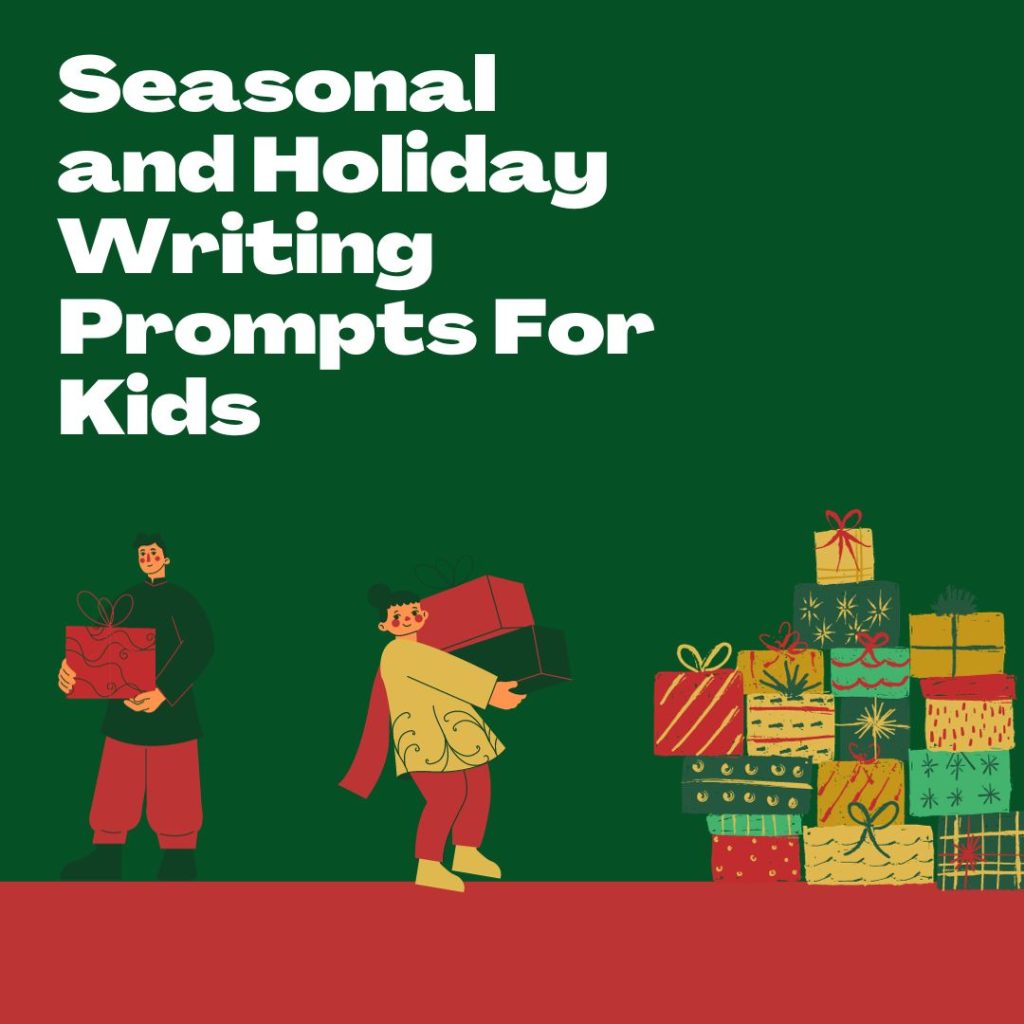
Seasonal and Holiday Writing Prompts For Kids
Seasonal and holiday writing prompts allow kids to let their imaginations run wild and express their creativity. Whether it’s crafting a spooky ghost story for Halloween, describing the magic of winter through poetry, or penning a heartfelt letter to Santa Claus, these prompts offer a chance for children to explore different themes and engage in writing activities that are both fun and educational. With each changing season and holiday, a whole new world of inspiration is waiting to be explored. So, grab a pen and paper, and let’s dive into the enchanting world of seasonal and holiday writing prompts for kids!
- Imagine you are taking a walk in [season]. Describe all the sights, sounds, and smells you encounter.
- Write a story about a magical [event] that happens in your town. What happens, and how does it make everyone feel?
- Create a persuasive essay explaining why [topic] is the best holiday tradition. Give reasons and examples to support your argument.
- Write a letter to Santa Claus about the most memorable [event] you’ve experienced this year. What made it special?
- Write a poem about your favorite activities to do during [season]. Use descriptive language to make your readers feel like they are experiencing it, too.
- If you could create a new [topic]-themed holiday, what would it be called and how would people celebrate it? Describe the traditions and customs.
- Imagine you are attending a [event] with your family. Write a diary entry describing all the exciting things you see, taste, and do during the day.
- Write a short story about a magical creature that only appears during [season]. Describe its appearance, behavior, and how encountering it changes someone’s life.
- Create an advertisement for an upcoming [event] in your community. Persuade people to attend by highlighting the unique and exciting aspects of the event.
- Write a letter to a friend explaining why you love celebrating [topic]-related holidays. Please share your favorite memories and traditions associated with it.
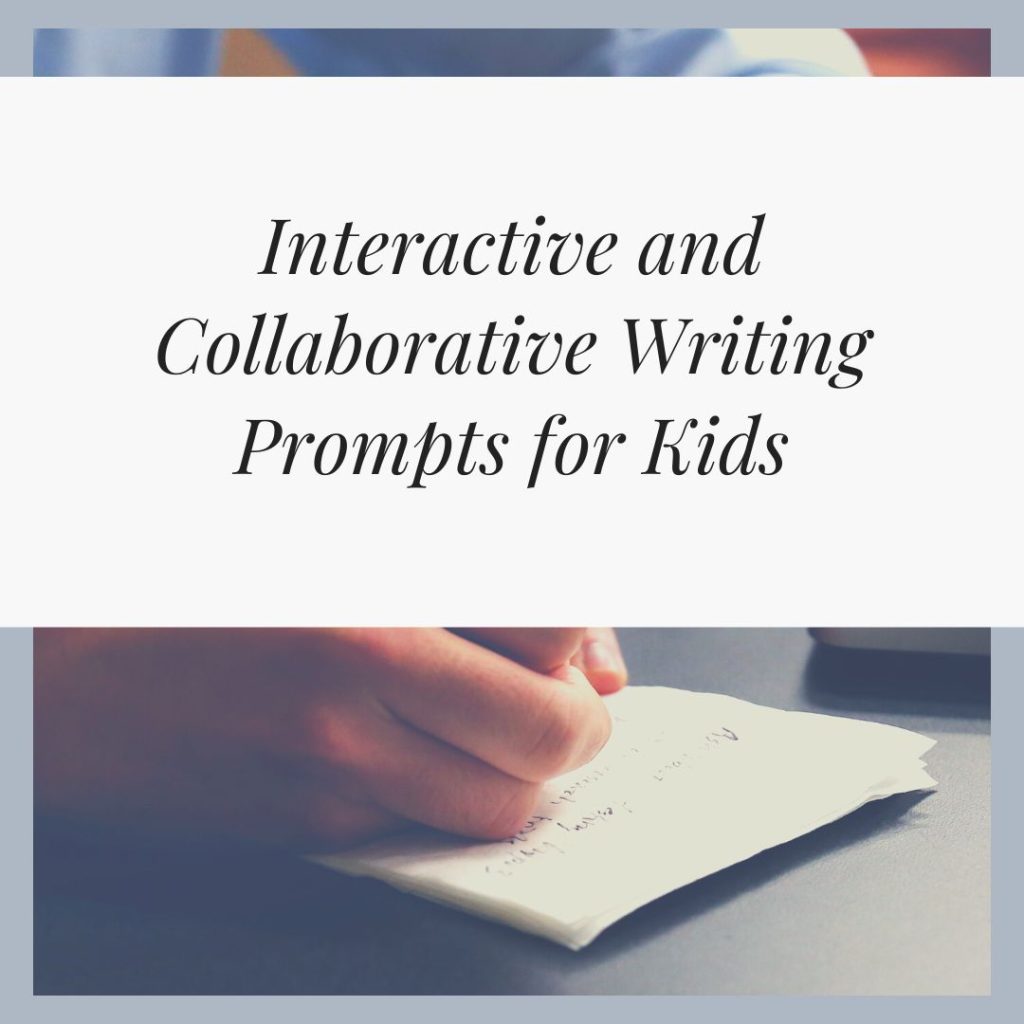
Interactive and Collaborative Writing Prompts
Interactive and collaborative writing prompts engage children in the writing process and encourage collaboration, making the experience enjoyable and educational.
Collaborative prompts for classroom or group activities
- Each student can customize their character [animal, superhero, fantasy creature] and contribute a panel to create an exciting and unique story.
- Create a collaborative music playlist: Let students choose their favorite songs from different genres [pop, rock, hip-hop] and compile them into a class playlist.
- Students can customize their art pieces [painting, sculpture, collage], choose a theme [nature, dreams, emotions], and collaborate on setting up an exhibition to showcase their work.
- Give students options to choose from [zoo, museum, nature park] and have them work together to plan logistics, activities, and transportation.
- Students can customize the game board, cards, and rules [adventure, mystery, fantasy], incorporating their favorite themes and challenges.
- Provide customization options like singing, dancing, magic tricks, or comedy acts, allowing students to showcase their unique talents.
- Let students choose a topic [science experiment, book review], [cooking tutorial, sports highlights] and collaborate on scripting, filming, and editing a video presentation.
- Offer customization options for topics [environmental issues, technology in schools] and allow students to form teams based on their interests or beliefs.
- Students can customize the layout, choose the plants or vegetables to grow [flowers, herbs, fruits], and collaborate on planting and maintaining the garden.
- Provide customization options for sections such as news, sports, and entertainment [book reviews, comics, puzzles], and allow students to contribute articles, interviews, and artwork.
Writing Games: Prompts inspired by games, puzzles, or riddles
- Roll a set of story cubes with different images on each side. Use the images that come up to create a unique story about [something the kids are interested in].
- Jumble up a set of words and challenge the kids to unscramble them. Once unscrambled, they must use each word in a sentence related to [a topic they enjoy].
- Provide a picture or painting related to [a subject they like] and ask the kids to describe what they see in detail. Please encourage them to use their imagination and create a story based on the image.
- Start a story with an opening paragraph and have the kids take turns adding a section to continue the story about [a topic of their choice]. See where their imagination takes them!
- Give the kids a piece of text with specific letters or words missing. Their task is to fill in the blanks and decipher the hidden message related to [something they find fascinating].
- Ask the kids to design and describe their original character, including details like appearance, personality, and special abilities. The character can be from [their favorite book, movie, or video game].
- Provide a theme or topic that interests the kids, and challenge them to write a poem using specific rhyming patterns or styles, such as haiku or limericks, about [the chosen theme].
- Encourage the kids to imagine they are someone else for a day, like a historical figure or an animal, and have them write a diary entry from that perspective. They can choose someone or something related to [a subject they are passionate about].
- Have the kids invent their own silly or creative words and then write a definition for it. They can also use the word in a sentence or a short story related to [a topic they enjoy].
- Ask the kids to choose a location, real or imaginary, related to [something they are interested in], and create a travel brochure promoting that place. They can include descriptions and attractions and even design their cover.
Dialogues and Scripts Prompts
- Two friends who love [sports] are planning a magical adventure to find a hidden treasure in their backyard. What magical creatures do they encounter along the way?
- A group of kids who enjoy [music] decide to put on a play about their favorite fairy tale. Who plays the hero and the villain, and what unexpected twist do they add to the story?
- Two siblings passionate about [science] have to devise a plan to convince their parents to adopt a new pet. How do they present their argument, and what kind of pet do they choose?
- A group of kids fascinated by [history] discovers a time machine in their basement. Where do they travel to, and what exciting (or scary) adventures do they have in different periods?
- Two best friends who love [art] are organizing a surprise party for their teacher. How do they keep it a secret, and what creative ideas do they develop for decorations and games?
- A young inventor who enjoys [technology] creates a robot that can do all their chores, but it starts causing chaos around the house. How do they fix the situation and make their invention helpful again?
- Two kids passionate about [nature] find a mysterious map that leads them to a hidden treasure in a nearby park. Who else is after the treasure, and how do the kids outsmart them?
- A group of friends who love [mysteries] start a detective club and solve mysteries in their neighborhood. What kind of cases do they take on, and how do they use their unique skills to crack the clues?
- Two siblings who enjoy [adventures] have to babysit their mischievous younger cousin for the day. What kind of trouble does the cousin get into, and how do they all learn to work together?
- A group of kids interested in [ghost stories] discover that friendly ghosts haunt their school. How do they help the ghosts find peace and turn their haunted school into a fun and welcoming place?
Picture-Based Prompts
Picture-based prompts give young writers a visual stimulus, allowing them to explore their thoughts and ideas more concretely. Whether it’s a whimsical illustration or a captivating photograph, picture-based prompts have the power to inspire children to write stories, describe scenes, or even create their worlds.
- Show the children a picture of a [fantasy world] with [magical creatures] and ask them to write a story about a [brave young adventurer] who must save the kingdom from an [evil villain]. What [exciting challenges] does the adventurer face, and how do they [overcome obstacles]?
- Display an image of a [mysterious island] with a [hidden treasure] buried in the sand. Ask the children to imagine the treasure and write a story about a group of [courageous explorers] who embark on a [thrilling treasure hunt].
- Provide the children with a blank comic strip template and ask them to create a story about a [superhero/superheroine] who possesses the power of [their choice]. What [villains or foes] does the superhero encounter, and how do they use their powers to [protect the city/world]?
- Share an image of a [magical forest] with talking animals and enchanted objects. Ask the children to write a story about a [curious young protagonist] who stumbles upon this enchanted place. What important lessons do they learn from the animals, and how do they [restore harmony] in the forest?
- Show the children a picture of a [spaceship] landing on an unknown planet. Ask them to imagine what kind of [extraterrestrial beings] inhabit the earth and write a story about an [adventurous space explorer] who discovers new worlds and [solves intergalactic mysteries].
- Provide the children with a blank comic strip template and ask them to create a story about a group of [time-traveling friends] who embark on exciting adventures across different [periods]. Where do they [travel through time], what [historical events or eras] do they witness, and how do they [preserve the timeline]?
- Display an image of an [underwater paradise] with playful mermaids/mermen and colorful coral reefs. Ask the children to write a story about a [brave young mer-being] who discovers a hidden treasure and must protect it from [greedy pirates or sea monsters].
- Show the children a picture of a [spooky haunted house] on a moonlit night. Ask them to imagine who the ghost haunting the house is and write a story about a group of [fearless ghost hunters] who uncover its secrets and [solve supernatural mysteries].
- Provide the children with a blank comic strip template and ask them to create a story about a group of [animal friends with musical talents] who form a band and embark on a musical adventure. What [obstacles or challenges] do they face, and how do they work together to achieve their dream of performing on stage?
- Share an image of an [enchanted garden] with talking flowers and magical plants. Ask the children to write a story about a [young wizard/wizardess in training] who discovers their magical abilities can bring plants to life. How do they maintain [harmony and balance] in this enchanted garden, protecting it from harm?
Conclusion
Writing prompts for kids serve as a valuable tool to stimulate creativity, improve writing skills, and help children articulate their thoughts and ideas more effectively. They not only are fun activities that keep kids engrossed but also contribute towards enhancing their language proficiency.
Parents and educators must incorporate these prompts into children’s daily routines to foster a love for writing from an early age. Remember, practice makes perfect, so the more your child engages in such activities, the better their writing will become. So why wait? Start using these prompts today and watch your child’s imagination take flight!
What is the main purpose of Writing Prompts for Kids?
The main purpose is to inspire creativity, improve writing skills, and encourage imagination in children.
Are these Writing Prompts suitable for all age groups?
Writing prompts cater to a wide range of ages but are primarily designed for kids aged 1-18 years old.
How often should my child practice with these Writing Prompts?
Ideally, your child should engage with the writing prompts daily to enhance their creative thinking and writing skills.
Can these Writing Prompts help improve my child’s storytelling ability?
Yes! Regularly engaging with diverse range of writing prompts can significantly enhance your child’s storytelling skills.